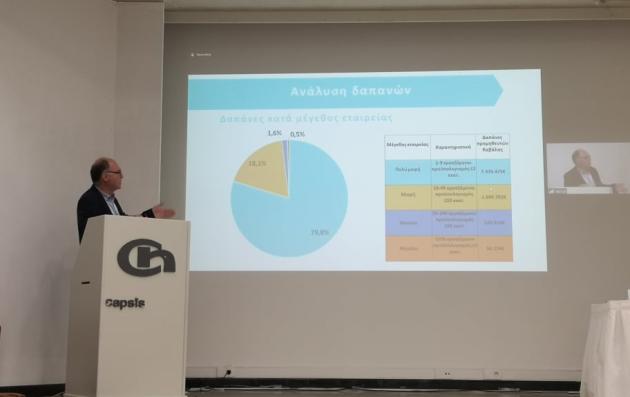Date of label : 29/10/2024
-
Kavala , Greece
-
Size of city : 66.376 inhabitants

Presentation of the centralised procurement practice
Summary
Kavala's (EL) innovative public procurement strategy commenced with extensive pre-market consultations, involving SMEs and other stakeholders to embed rigorous environmental criteria into technical specifications. Through dedicated working groups and supplier consultations, Kavala ensured adherence to both EU and national regulations, emphasising biodegradability and biocidal product standards. Launched in November 2020 across seven categories, the tender for cleaning products prioritised recyclable and plastic-free materials. Despite initial bidder compliance challenges, the initiative successfully awarded contracts totalling EUR 465 628 to four SMEs, solidifying Kavala's role as a trailblazer in sustainable procurement practices. This practice is now heralded as a national benchmark.
The solutions offered by the Good Practice
Kavala's sustainable procurement initiative represents a significant advance in public sector practices, aligning with strategic city goals emphasising environmental sustainability, economic resilience, and community involvement.
The initiative’s key milestones include:
- Comprehensive pre-market consultations engaging SMEs and stakeholders.
- Specialised working groups with municipal bodies and trade associations.
- A robust supplier database.
Activities focused on setting and promoting green procurement standards, educating suppliers on tendering protocols, and embedding rigorous environmental criteria into the technical specifications and terms of contracts.
The public procurement initiative's impact has been clear. For instance, the landmark tender launched in 2020 for cleaning materials mandated zero plastic use in packaging and prioritised recyclable materials, thereby reducing Kavala’s ecological footprint. Contracts totalling EUR 465 628 were awarded to four SMEs, over a two-year period, bolstering local enterprises.
Nationally recognised as a best practice, Kavala's model has been highlighted in forums and included in the Greek Ministry of Development's repository. The initiative enhances stakeholder engagement, clarifies labeling, and upgrades standards.
Building on the sustainable and integrated urban approach
The Municipality of Kavala has pioneered a green tendering approach for cleaning materials, which integrates environmental, economic, and social dimensions.
Environmental: Kavala mandated zero plastic in packaging, and emphasised recyclable, biodegradable materials, aligning with EU and national standards. This reduces waste and promotes sustainable consumption.
Economic: The initiative boosted local economic resilience by engaging SMEs, awarding EUR 465 628 to four businesses over two years, fostering local production and innovation.
Social: Extensive pre-market consultations focused on transparency, training suppliers on tendering, and promoting fair competition. Specifications for non-toxic products also aimed to enhance public health.
The practice adopts an integrated approach, by embedding green criteria into the public procurement process from pre-market consultations to contract evaluation.
In the future, Kavala plans to refine labelling and supplier training, emphasising stakeholder trust-building and market analysis for effective green procurement.
If adopted widely, Kavala's practice could reduce environmental footprint, stimulate economies, and advance sustainable urban development across Europe, aligning with EU policies.
The practice offers insights for municipalities globally striving for sustainability.
Based on participatory approach
Kavala engaged key stakeholders and anchor institutions from the project's inception to co-create these tenders. Stemming from its involvement in the URBACT III-Making Spend Matter transfer network, Kavala applied the methodology to ensure inclusive, fair, and continuous stakeholder participation. The stakeholders included trade associations, the Chamber of Commerce, suppliers, the technical chamber, municipal services, hospitals, police, consumer protection NGOs, and legal services.
What difference has it made?
Kavala's green tendering practice for cleaning materials has significantly impacted the local community:
- Advanced sustainable public procurement by introducing strict environmental criteria like 0% plastics, and promoting sustainable consumption.
- Contracts worth EUR 465 628 awarded to four local SMEs over two years, boosting the local economy and fostering innovation in sustainable products.
- The community indirectly benefited from reduced environmental impact and improved health outcomes.
- Public procurement shifted from cost-based to a sustainability focus, influencing national practices and recognised in a best practices repository.
Enhanced stakeholder engagement and trust, pivotal for adopting new procurement approaches emphasising quality and the environment.
In conclusion, Kavala's pioneering practice sets standards for green procurement, driving economic resilience, sustainability, and stakeholder involvement across Greece's public sector.
Why this Good Practice should be transferred to other cities
Kavala's sustainable procurement initiative is relevant to other cities with public procurement, and aligns with UN Sustainable Development Goals (SDGs), in particular SDG 3 (Good health and wellbeing), SDG 8 (Decent work and economic growth), SDG 11 (Sustainable Cities and Communities), SDG 12 (Responsible consumption and production), and SDG 13 (Climate action), by mandating zero plastic use and promoting recyclable materials, engaging local interprises, and through community involvement.
Kavala's sustainable public procurement model serves as a blueprint for other cities under the Urban Agenda for the EU, to promote sustainable urban development, and it has been nationally recognised as a best practice.
The environmental and social criteria in tendering processes can be adapted to national, regional and local laws and regulations, to suit other city contexts. Adaptations may also include adjusting procurement standards to local environmental regulations, modifying educational programmes for suppliers based on regional needs, and tailoring stakeholder engagement strategies to reflect community dynamics. Flexibility ensures the initiative's effectiveness and relevance across diverse urban environments.
Key elements for successful transfer include:
- Comprehensive documentation of procedures and outcomes.
- Clear guidelines for implementation.
- Training sessions for stakeholders.
- Effective adaptation to local contexts and regulations.
- Ongoing support and monitoring.
- Collaboration with relevant institutions to ensure alignment with sustainability goals and economic objectives.
The initiative was showcased by Kavala’s Chief Financial Officer, Ioannis Chatzikonstantinou, on 25 January 2021at a local authorities event. It has since been featured at the Ministry of Development, included in their repository of exemplary practices, and in the URBACT III-MSM programme as part of its transfer plan.
